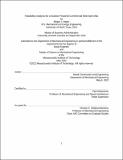Feasibility Analysis for a Nuclear-Powered Commercial Merchant Ship
Author(s)
Hagen, Megan J.
DownloadThesis PDF (5.730Mb)
Advisor
Sclavounos, Paul
Terms of use
Metadata
Show full item recordAbstract
This thesis evaluated advanced reactor designs to determine the best option for installation onboard a civilian container ship in support of the IMO’s strategy for reducing greenhouse gas emissions from ships. Greenhouse gas reduction has been a major challenge within commercial maritime shipping as the industry has recently expanded significantly. Although the industry continues to grow, these emissions must be greatly lowered beyond current values by 2030 for climate change to be meaningfully combated.
Concurrently, the global nuclear power industry has made tremendous advancements in developing new technologies throughout the last two decades, and at the forefront of these efforts are seven Generation IV reactor designs. These designs were created to improve economics, increase passive safety measures, and expand fuel cycle control, and so far, research efforts have been so successful that the idea of incorporating these designs into the overall climate change solution has been met with significant support from both public and private organizations throughout the world.
Therefore, Generation IV reactor designs were evaluated based on their technical feasibility and projected commercial readiness to determine the best option to supply propulsive and electrical power onboard a commercial container ship. Related to commercial shipping, a nuclear-powered container ship has been considered and analyzed thoroughly in the past, but the introduction of Generation IV technology presents an interesting opportunity to revisit the concept and determine if using these designs would increase real-world implementation feasibility.
To fully understand the research space, past nuclear-powered maritime applications as well as previously conducted research related to this topic were reviewed to validate this concept’s feasibility. The licensing and regulatory process was also analyzed to understand the feasibility of final commercialization, and from this analysis, liquid metal reactors (specifically, Sodium Cooled Reactors, Molten Salt Fast Reactors and Lead-cooled Fast Reactors) were selected as optimal solutions for implementation onboard container ships.
Date issued
2022-05Department
Massachusetts Institute of Technology. Department of Mechanical EngineeringPublisher
Massachusetts Institute of Technology